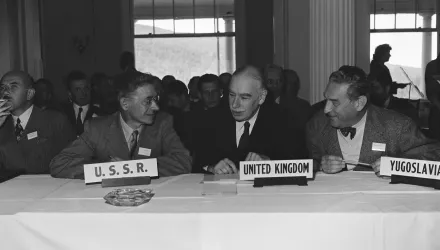International Security is America's leading peer-reviewed journal of security affairs.
This policy brief is based on “Testing the Surge: Why Did Violence Decline in Iraq in 2007?” which appears in the summer 2012 issue of International Security.
Bottom Lines
• Foreign Intervention Is a Poor Mechanism for Spurring Democratic Change. On average, states that experience foreign-imposed regime change experience little democratic improvement.
• Focus on Institutional Change, Not Leadership Change. Interventions that “decapitate” a regime by removing an individual leader, but leave the wider political institutions of the regime intact, are the least likely to promote democracy. Interventions are more likely to succeed when the intervener takes concrete steps to build new democratic political institutions, such as sponsoring elections, but only in states where economic and social conditions are already favorable to democracy.
• The Paradox of Foreign-Imposed Regime Change. Policymakers weighing foreign-imposed regime change as a path to democracy in foreign states face a paradox: weak or poor states are the most vulnerable to imposed regime change, but are also the least likely to democratize following
intervention.
Foreign-Imposed Regime Change and Democracy
Policymakers and scholars are increasingly interested in the question of whether sustainable democratic institutions can be imposed by force. The U.S. invasions of Afghanistan in 2001 and Iraq in 2003 were justified by U.S. leaders in part on the grounds that building democratic regimes in these states would initiate a wave of democratization in the region. In 2011, a coalition of NATO countries intervened on behalf of insurgents in the conflict in Libya, resulting in the overthrow of the Muammar Gaddafi regime. With many in the international community now calling for international intervention in the conflict in Syria, the question of forcible regime change and its consequences is again high on the international agenda.
Can intervention be an effective means of promoting democracy? Intervention optimists point to successful cases such as the U.S. occupations of Japan and West Germany following World War II, which transformed war-time adversaries into stable, democratic allies. Intervention pessimists, in contrast, argue that regime change fails to lead to democracy because interveners are often motivated by goals other than democracy promotion, political institutions imposed by outsiders are often viewed as illegitimate, or outsiders lack sufficient knowledge of or influence over local politics and actors.
Our study answers this question by examining every case of foreign-imposed regime change in the twentieth century and its impact on the democratic trajectory of targeted states. When looking at this historical record, states that experienced imposed regime change on average saw little democratic gain compared with similar states that did not experience regime change, and were no more likely to undergo a transition to consolidated democracy. Interventions conducted by democratic states were no more likely to result in democratic improvement when compared against interventions conducted by authoritarian regimes, and interventions by the United States were no more successful than interventions by non-U.S. democracies.
Focus on Institutions, Not Individual Leaders
Although on balance foreign-imposed regime change fails to lead to democratic change, several factors can increase the odds of success. Regime change is most likely to result in democratic progress under three conditions: when the intervening state takes concrete steps to create new democratic political institutions, such as sponsoring elections; when economic and social conditions in a state targeted for intervention are already favorable to democracy; and when interventions restore a previous democratic regime to power.
First, interventions that overthrow a state’s primary leader, but leave the wider political institutions of the regime intact, are the least likely to result in sustained democratic change. Leaders who are brought to power by foreign intervention often lack a broad-based domestic constituency, can become dependent on the outside power for support, or are more interested in consolidating their own rule than in democratic reform. These leaders are frequently unwilling to risk losing power through free and fair elections. For example, Mohammed Reza Pahlavi (Iran 1953) and Augusto Pinochet (Chile 1973) came to power in the wake of U.S.-backed coups, but established dictatorships and resisted relinquishing office through democratic procedures. Other leaders, such as Carlos Castillo Armas (Guatemala 1954), were themselves violently removed from power (a fate shared by Iran’s Reza Pahlavi).
Second, favorable domestic conditions can help sustain democratic institutions created by outsiders. Three internal factors are associated with successful externally-led democratization: economic development, social and ethnic homogeneity, and a previous history of democratic government. The wide range of liberalizing reforms initiated by the United States during the military occupations of Japan and West Germany beginning in 1945 succeeded in part because these countries already had industrialized economies with low levels of ethnic and linguistic diversity. However, states without these preconditions face substantial barriers to democratization, even with the best efforts of outsiders. In Iraq, regime change triggered a violent sectarian conflict among the Iraqi Sunni and Shia communities, hindering the political compromises and power-sharing necessary for the emergence of democratic rule.
Foreign-imposed regime change can also succeed under a third condition: when intervention restores a previous democratic regime to power. The Allied victory in 1945 returned several democratic governments to power in Western European states that had been occupied by Germany, including France, Belgium, and the Netherlands. However, in these cases military intervention did not transform non-democratic states into democracies; rather, the United States restored legitimate and long-standing regimes to power after a war-time interruption. These cases therefore tell us little about the ability of outsiders to engineer democratic institutions where they did not previously exist.
The Paradox of Foreign-Imposed Regime Change
Policymakers considering imposing regime change as a means to create democracy in foreign states confront a paradox. Weak and poor states such as Afghanistan, Iraq, and Libya may appear to be tempting targets for regime change, particularly if alternative policies such as economic sanctions, international isolation, or coercive diplomatic pressure fail to alter their behavior. However, the evidence suggests that these states are the least likely to democratize following imposed regime change, and intervention may carry significant downsides, such as a heightened risk of civil war or of further destabilizing already fragile state institutions. “Decapitating” a regime by removing an individual leader while avoiding any deeper involvement in building new political institutions may appear to be a low-cost strategy, but is unlikely on its own to result in meaningful democratic change.
Any democratic improvements achieved through military intervention must also be weighed against the costs. The war in Iraq, for example, resulted in approximately 4,500 U.S. military fatalities and over 100,000 Iraqi civilian deaths (according to conservative estimates), at an estimated financial cost of over $4.5 trillion dollars, including the cost of funding military operations, interest payments on the debt incurred, and long-term medical care for injured veterans. Yet after a decade of war, these efforts have produced little democratic progress: according to measures such as Freedom House’s Freedom in the World survey, Iraq is barely more democratic than it was prior to the 2003 invasion. Even if democratic gains are possible under some circumstances, military intervention may not be worth the price.
Related Resources
Bueno de Mesquita, Bruce, and George W. Downs. “Intervention and Democracy.” International Organization 60, no. 3 (Summer 2006): 627-649.
Dobbins, James, et al., America’s Role in Nation-Building: From Germany to Iraq. Washington, D.C.: RAND, 2003.
Downes, Alexander B. “Regime Change Doesn’t Work.” Boston Review 36, no. 5 (September/October 2011): 16-22.
Enterline, Andrew J., and J. Michael Greig. “Beacons of Hope? The Impact of Imposed Democracy on Regional Peace, Democracy, and Prosperity.” Journal of Politics 67, no. 4 (November 2005): 1075-1098.
Smith, Tony. America’s Mission: The United States and the Worldwide Struggle for Democracy in the Twentieth Century. Princeton, N.J.: Princeton University Press, 1994.
Alexander B. Downes is Associate Professor of
Political Science and International Affairs at George
Washington University.
Jonathan Monten is Assistant Professor of Political
Science at the University of Oklahoma.
International Security is America’s leading peer-reviewed journal of security affairs. It provides sophisticated analyses of contemporary, theoretical, and historical security issues.
International Security is edited at Harvard Kennedy School’s Belfer Center for Science and International Affairs and is published by The MIT Press.
For more information about this publication, please contact the International Security publications coordinator at 617-495-1914.
Statements and views expressed in this policy brief are solely those of the authors and do not imply endorsement by Harvard University, the Harvard Kennedy School, or the Belfer Center for Science and International Affairs.
Downes, Alexander and Jonathan Monten. “Why Foreign-Imposed Regime Change Is Rarely a Path to Democracy.” September 1, 2012







